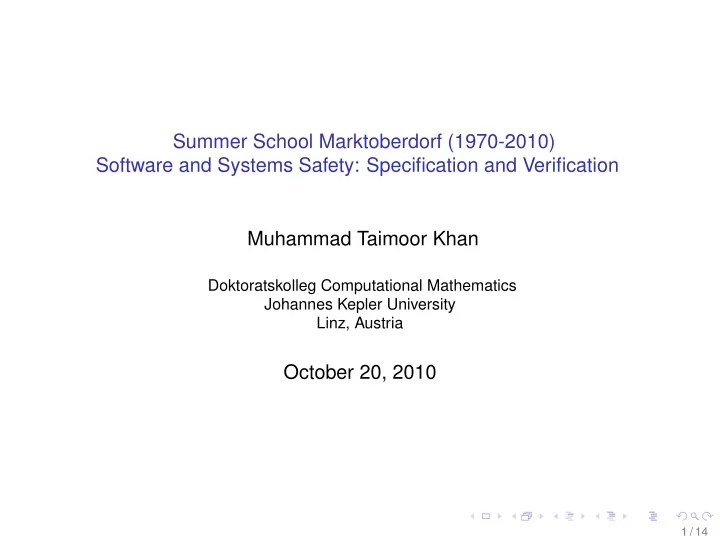

Summer School Marktoberdorf (1970-2010) Software and Systems Safety: Specification and Verification Muhammad Taimoor Khan Doktoratskolleg Computational Mathematics Johannes Kepler University Linz, Austria October 20, 2010 1 / 14
Outline ◮ Introduction ◮ Organization ◮ Lectures ◮ Tutorials ◮ Model-Driven Development of Reliable Services 2 / 14
Introduction ◮ History ◮ NATO Software Engineering Conference in Germany (1968) ◮ Tony Hoare and E.W. Dijkistra ◮ Introduction ◮ For two weeks (August 3-15, 2010) ◮ Academic Activities ◮ Entertainment 3 / 14
Model-Driven Development of Reliable Services by Manfred Broy ◮ detail on coming slides. 4 / 14
Unifying Models of Data Flow by Tony Hoare ◮ 5 / 14
Model Checking by Doron Pelad ◮ Modeling of software and hardware systems ◮ Software specification using temporal logic and Buchi Automata ◮ Translation between logic and automata ◮ Model Checking Algorithms ◮ How to make it work in practice: abstraction/reduction/BDDs 6 / 14
Issues of Adaptable Software for Open-World Requirements by Carlo Ghezzi ◮ Specifications and service level agreements among different stakeholders and subsystems ◮ Functional and non-functional qualities ◮ Architecture: how do the requirements for dynamic adaptation aspect software composition ◮ Language support to dynamic adaptation ◮ Modelling and analysis: development time requirements vs runtime requirements 7 / 14
Requirements Models for System Safety and Security by Connie Heitmeyer ◮ Modeling and formal specification of requirements ◮ Consistency and completeness checking of requirements ◮ Simulation of requirements to check their validity ◮ Generating invariants from requirements specifications ◮ Formal verification of requirements ◮ Testing and automatic code generation based on an operational requirements model ◮ Modeling and analyzing systems for critical properties (e.g. security and fault-tolerance) 8 / 14
Formal Methods and Argument-based Safety Cases by John Rushby ◮ 9 / 14
Abstraction for System Verification by Susanne Graf ◮ Appropriate abstraction is the key for successful verification of programs/systems ◮ General verification is of high complexity task (state explosion) ◮ General framework for abstraction ◮ Using abstractions to (meaningfully) reason about large composed systems ◮ General contract framework to prove stronger properties ◮ Proving properties with top-down design constraints and bottom-up abstractions 10 / 14
Model-based Testing by Ed Brinksma ◮ Model-based testing (terminology and concepts) ◮ Derivation of functional tests from models in the form of input/output transition systems ◮ Theory and tools can be extended to deal with real-time behaviour in specifications, implementations and tests ◮ Test selection and coverage 11 / 14
From Concurrency Models to Numbers: Performance, Dependability, Energy by Holger Hermanns ◮ 12 / 14
Formal Verification by John Harrison ◮ 13 / 14
Model-based Verification and Analysis for Real-Time Systems by Kim Larsen ◮ 14 / 14
Recommend
More recommend